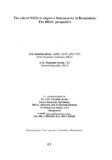| dc.contributor.author | Hyder, SM Ziauddin | |
| dc.contributor.author | Husain, A.M. Muazzam | |
| dc.date.accessioned | 2020-01-06T05:31:51Z | |
| dc.date.available | 2020-01-06T05:31:51Z | |
| dc.date.issued | 1999 | |
| dc.identifier.citation | Hyder, S. M. Z., & Husain, A. M. M. (1999). The role of NGOs to improve food security in Bangladesh: the BRAC perspective. Research Reports (1999): Social Studies, Vol – XXII, 68–82. | en_US |
| dc.identifier.uri | http://hdl.handle.net/10361/13385 | |
| dc.description.abstract | Bangladesh is one of the worst food insecure nations in the world today. This paper looks into
some food security issues of the poor, the most food insecure group, particularly with respect to
the role of non-governmental organisations (NGO). Some learning from the development
programmes of BRAC, which are directed to the poor women to improve their food security is
briefly highlighted in this paper. A long-term commitment to the very poor as well as targeted
efforts supported by short-term food subsidy is required to improve their situation on a sustainable
basis. Effective partnership between the government, NGOs and donors is a key to the success in
increasing the current food security situation. | en_US |
| dc.language.iso | en | en_US |
| dc.publisher | BRAC Research and Evaluation Division (RED) | en_US |
| dc.subject | NGOs | en_US |
| dc.subject | Food security | en_US |
| dc.subject | BRAC | en_US |
| dc.subject | Bangladesh | en_US |
| dc.subject.lcsh | Non-governmental organizations -- Bangladesh. | |
| dc.subject.lcsh | Food supply. | |
| dc.title | The role of NGOs to improve food security in Bangladesh: the BRAC perspective | en_US |
| dc.type | Research report | en_US |

